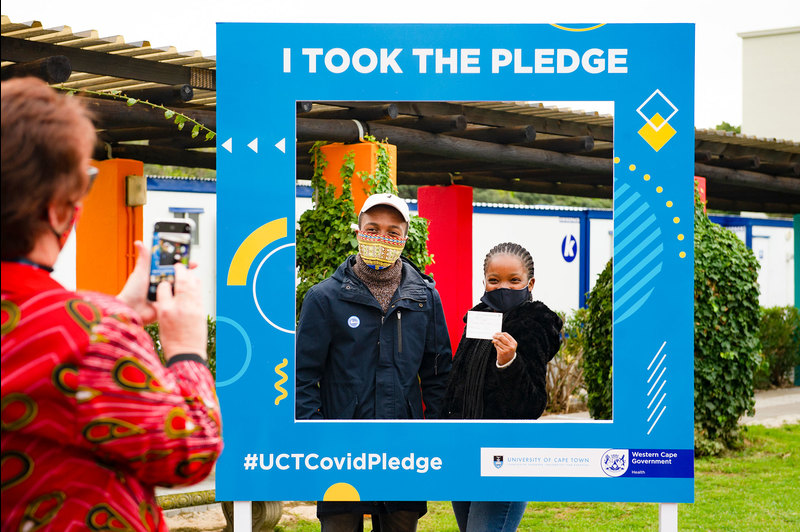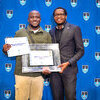International students can get vaccinated
29 September 2021 | Story Sharon Mogale. Photo Lerato Maduna. Read time 4 min.
On 20 August 2021 Sharon Mogale, a final-year medical student at the University of Cape Town (UCT) and the Students’ Representative Council’s (SRC) international students’ coordinator, posted a tweet: “International students can get vaccinated; do not hesitate, use your passport number.” Many of her international friends, followers and colleagues responded to the tweet to verify if this was true. As such, she felt compelled to respond in an article to encourage the international community in and outside of UCT to get vaccinated.
When the government initially announced the vaccine strategy in January 2021, foreign nationals were excluded from the eligibility criteria; only South African citizens were allowed to register. However, President Cyril Ramaphosa later announced that the vaccination process would be open to all adults living in South Africa.
The National Electronic Vaccination Data System (EVDS) self‑registration portal currently allows foreign nationals to register for the vaccine using either their passport number or asylum seeker/refugee number. As a student working on the clinical platform (who is also very anxious about COVID‑19), this is considered to be a big step towards lowering SARS‑CoV‑2 hospital admissions and decreasing the pressure of the pandemic on the healthcare system. However, the current government strategy has not yet addressed vaccine inequity affecting all adults living in South Africa.
Vaccinating undocumented immigrants
Although the vaccination strategy will not cover all South Africans by the end of this year, undocumented immigrants form a significant portion of the country’s population. According to a recent statement from Statistics South Africa (Stats SA), released on 5 August 2021, 2.2 million people living in South Africa (Census 2011) were born outside the country. However, these statistics do not differentiate between documented and undocumented immigrants and Stats SA can only estimate that about 3.9 million foreign nationals currently reside in South Africa.
“The current government vaccine promotion strategy needs to be more inclusive.”
While the EVDS portal does not have an option for undocumented immigrants to register, they can still walk in to a vaccination site and complete the manual process of registering for the vaccine. Unfortunately, this information is not widely available.
The current government vaccine promotion strategy needs to be more inclusive by encouraging the vaccination of undocumented immigrants because there are existing barriers to good healthcare‑seeking behaviours among foreign nationals living in South Africa. This can be aggravated by the lack of reliable information aimed at undocumented immigrants. With less than 2% of the African continent vaccinated, it is also important to note that some international students may experience mixed emotions with being able to get vaccinated while their families back home do not share the same privileges due to inequitable vaccine distribution.
Vaccine solidarity
A recent article published by the Mail & Guardian and on the University of the Witwatersrand (Wits) website, and was written by multiple respected scientists such Professor Glenda Gray (Wits), Professor Yunus Moosa (University of KwaZulu‑Natal), Professor Marc Mendelson (UCT) and others, states that the we need to institute mass vaccination quickly to prevent more deaths due to COVID‑19 and severe COVID‑19 infections, which have shown to have lasting complications. It is for this reason that I firmly believe that true vaccine solidarity, which aims to overcome the pandemic, does not exclude people based on their nationality or immigration status.
“We all have a part to play in creating a healthy and just society.”
On an individual level, vaccine solidarity means understanding that vaccination is not just about personal protection; it is about taking the first step with millions of other vaccinated individuals towards overcoming a global pandemic that affects the most vulnerable in our society. These are the elderly population, those living with comorbid medical conditions, and, for me, what is most significant is seeing how COVID‑19 is creating a generation of orphans.
We all have a part to play in creating a healthy and just society, and it begins with us showing empathy through vaccinating, and encouraging our international community to get vaccinated.
 This work is licensed under a Creative Commons Attribution-NoDerivatives 4.0 International License.
This work is licensed under a Creative Commons Attribution-NoDerivatives 4.0 International License.
Please view the republishing articles page for more information.
UCT’s response to COVID-19
COVID-19 is a global pandemic that caused President Cyril Ramaphosa to declare a national disaster in South Africa on 15 March 2020 and to implement a national lockdown from 26 March 2020. UCT is taking the threat of infection in our university community extremely seriously, and this page will be updated with the latest COVID-19 information. Please note that the information on this page is subject to change depending on current lockdown regulations.
Minister of Health, Dr Joe Phaahla, has in June 2022 repealed some of South Africa’s remaining COVID-19 regulations: namely, sections 16A, 16B and 16C of the Regulations Relating to the Surveillance and the Control of Notifiable Medical Conditions under the National Health Act. We are now no longer required to wear masks or limit gatherings. Venue restrictions and checks for travellers coming into South Africa have now also been removed.
Read the latest document available on the UCT policies web page.
Campus communications
2022
UCT Community of Hope Vaccination Centre
On Wednesday, 20 July, staff from the University of Cape Town’s (UCT) Faculty of Health Sciences came together with representatives from the Western Cape Government at the UCT Community of Hope Vaccination Centre at Forest Hill Residence to acknowledge the centre’s significance in the fight against COVID-19 and to thank its staff for their contributions. The centre opened on 1 September 2021 with the aim of providing quality vaccination services to UCT staff, students and the nearby communities, as well as to create an opportunity for medical students from the Faculty of Health Sciences to gain practical public health skills. The vaccination centre ceased operations on Friday, 29 July 2022.
With the closure of the UCT Community of Hope Vaccination Centre, if you still require access to a COVID-19 vaccination site please visit the CovidComms SA website to find an alternative.
“After almost a year of operation, the University of Cape Town’s (UCT) Community of Hope Vaccination Centre, located at the Forest Hill residence complex in Mowbray, will close on Friday, 29 July 2022. I am extremely grateful and proud of all staff, students and everyone involved in this important project.”
– Vice-Chancellor Prof Mamokgethi PhakengWith the closure of the UCT Community of Hope Vaccination Centre, if you still require access to a COVID-19 vaccination site please visit the CovidComms SA website to find an alternative.
Frequently asked questions
Global Citizen Asks: Are COVID-19 Vaccines Safe & Effective?
UCT’s Institute of Infectious Disease and Molecular Medicine (IDM) collaborated with Global Citizen, speaking to trusted experts to dispel vaccine misinformation.
If you have further questions about the COVID-19 vaccine check out the FAQ produced by the Desmond Tutu Health Foundation (DTHF). The DTHF has developed a dedicated chat function where you can ask your vaccine-related questions on the bottom right hand corner of the website.
IDM YouTube channel | IDM website
“As a contact university, we look forward to readjusting our undergraduate and postgraduate programmes in 2023 as the COVID-19 regulations have been repealed.”
– Prof Harsha Kathard, Acting Deputy Vice-Chancellor: Teaching and Learning
We are continuing to monitor the situation and we will be updating the UCT community regularly – as and when there are further updates. If you are concerned or need more information, students can contact the Student Wellness Service on 021 650 5620 or 021 650 1271 (after hours), while staff can contact 021 650 5685.




















